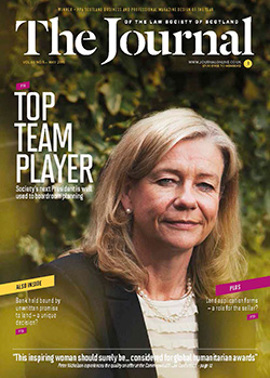Another "Whose money?" case
Former senior police officer, Alan Eadie and his firm, Eadie Corporate Solutions, continue to provide a premium service to the legal profession in tracing missing beneficiaries throughout Scotland and the rest of the world.
The firm is now also diversifying into other lines of investigative work.
Law firms are approaching Eadie to assist them with cases where they hold funds for individuals whom they cannot find. There are numerous scenarios where such funds may have been held for years, usually for perfectly valid reasons. These may relate to executries, where the intended recipients have failed to reply to correspondence. Or there may be excess funds from a retention for a common repair during a property sale.
Such cases also relate to situations where there is little information held with regard to ownership and, as a consequence, there is a perception of difficulty in correctly disposing of the funds. No matter what, there is still a legal obligation to have such funds dealt with appropriately, but the firms involved have no idea where to start looking.
Eadie comments: “Clients come to us with these types of cases, perplexed. Our attitude is simple: You have a puzzle; let us solve it for you.”
He adds that it is the experience of coping with a diverse criminal caseload, in previous police detective life, which equip him and his staff to deal with any conundrum which comes along.
“Investigating is really just common sense allied to hard work,” Eadie explains. “It’s about gaining even small snippets of information, and using them like building blocks to complete a case. Where we have an edge over others is the excellent training the police service provided us with – the ability to approach problems from different angles.”
That is borne out by the firm’s overall case-solving rate, which sits at an impressive 98% so far this year. Eadie has pride in the tenacity applied to each investigation, the ethos of never giving up.
Give me a name
A recent case in point was where he was instructed by a firm of solicitors to trace a person for whom funds were held, but who could not be found. The only information which was known was two initials and a surname. It was not even known what sex the person was. There was no address and the funds initiated in the early 80s in Edinburgh.
Without giving trade secrets away, the appropriate investigative techniques were utlilised. This included extensive research at Registers of Scotland and on various desktop systems, all the while applying that “building block” process, from what was initially known. The hard work paid off, and ultimately resulted in the investigation focusing in on one person. Following more work, an address was found, and Eadie wrote a carefully worded letter to the man he found, followed up by a visit to his home.
Eadie explains: “Just because we find a name and address doesn’t mean the job is done. There is a professional obligation to the client to ensure the case is completed correctly. That includes not only interviewing the person traced, but obtaining the necessary identification documents. That further corroborative process consolidates the research carried out.”
Only then does Eadie feel in a position to report to the client with 100% assurance that he has found the right person, as happened in this case.
He concludes: “All we want to do is support our clients, by taking these cases to one side, resolving them and ensuring the funds can then be disposed of, all with a minimum of fuss. After all, that's what we are here for.”
Take the money?
For advice from the Society's Professional Practice team on what to do when a beneficiary cannot be traced, or fails to cash their cheque, see Journal, September 2014, 46.
In this issue
- Sham marriages v Sham interviews: which is the greater evil?
- A trusts law for the modern era?
- When cash just isn't good enough
- Un voyage en vaut la peine*: SYLA does France
- SYLA ends season on a high
- Appreciation: John Henderson
- Reading for pleasure
- Opinion: Mohammed Sabir
- Book reviews
- Profile
- President's column
- People on the move
- Application forms: should the seller adjust?
- When sharing matters
- After the launch
- Game of strategies
- Broken promises
- Charity legacies: the 10% conundrum
- Another "Whose money?" case
- Barrister barred
- Rearranging the family ties
- Belief in the system
- Living by the code
- The sky's the limit
- Unfinished business
- Law reform roundup
- Appreciation: Joseph Beltrami
- LBTT: what does it mean in practice?
- For those of a certain age
- Claims: trending?
- Ask Ash
- A man for all reasons
- The "TER approach"






